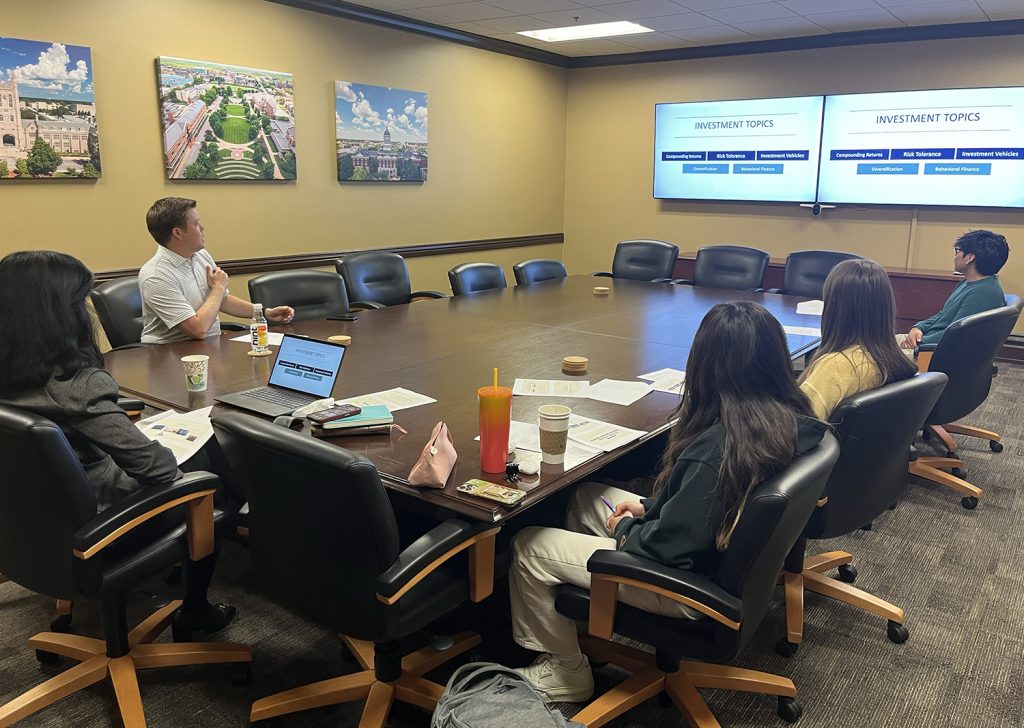Published on April 28, 2023

This past semester, two University of Missouri administrators took on instructor roles and shared their expertise with Honors College students. Latha Ramchand, Mizzou Provost and Executive Vice Chancellor for Academic Affairs, and Cooper Drury, dean of the College of Arts and Science, served as professors for two unique Honors Tutorial courses.
Credit, Debt, and Budgets
Ramchand’s course, Credit, Debt, and Budgets, taught students about personal financial literacy and how the financial system works, while taking extra care to relate the course concepts back to the student experience. Ramchand equipped her students with the skills they need to teach financial literacy to others, which helped cement the course material in students’ minds.
Assignments and classes varied greatly, but all centered on a student’s personal finances. Ramchand’s students gathered information about their financial situation, used it to create a personal budget and learned how to file tax returns. The class also featured speakers such as bankers, stockbrokers, and individuals from the financial aid office who could further students’ financial literacy.
“My personal favorite lecture was the day we discussed investing with a guest lecturer,” said junior architectural studies major Vivienne Lea. “As a student who comes from a low-income background, the world of financial literacy feels very foreign to me. This class opened a world of knowledge to me that previously may have been inaccessible.”

Students in Credit, Debt, and Budgets also learned about how to teach financial literacy to others. In this way, Ramchand’s students could play a part in reducing America’s financial illiteracy, while also furthering and solidifying their own personal knowledge of the subject.
“At my previous institution I taught a class like this, and part of the requirement for the grade was having the students go and teach these skills to high school seniors,” said Ramchand. “It’s a big leap when you go from you learning the material to being able to teach that material, because that’s when you really internalize it.”
International Relations Through Fiction
As a longtime professor of international relations and political science, Drury is acutely familiar with some of the struggles students have had with his course material. His class, International Relations Through Fiction, taught lessons about foreign policy through a variety of fictional works.
“International relations can seem quite daunting to students at times … I think it sometimes gets really difficult for students to understand,” said Drury. “I realized when I was teaching my introductory classes that really understanding politics is not that dissimilar to how individuals interact.”
Drury’s course strayed away from the dramatized versions of historical fiction which can sometimes dominate media. Instead, International Relations Through Fiction tapped into other works, such as Star Trek, to glean important foreign policy lessons from works of fiction.
Framing the course as an Honors Tutorial meant that the course took place in a small group setting that allowed for deep discussion on topics. The four students in Drury’s course completed assigned readings in preparation for an in-class discussion. After their discussion, Drury presented select episodes and clips of the fictional works to the class. This pattern of instruction allowed him to boil down the complex topics of international relations into simple and easily digestible examples.
“Star Trek is essentially the Cold War. The Federation is the West, the Klingons are the Soviets, and the Romulans are the Chinese,” said Drury. “Ultimately, you get to see a lot of aspects of international relations in one single episode.”
For the students in Drury’s course, International Relations Through Fiction served as a one-stop-shop for many of the benefits the Honors College can provide. The whirlwind of opportunities at a university as large as Mizzou can sometimes be hard to digest. Honors Tutorials help students easily identify all of the resources they have at their disposal.
“One of the things that you get when you’re at a top-tier research university like MU, is that you have got people who have state-of-the-art knowledge, and all of our Honors students get access to these world-class experts,” said Drury. “And there aren’t too many students who get to do that, right?”
Honors Tutorial courses can be a great way for Mizzou students to explore unique topics that interest them in a small setting. With access to premier faculty, Honors students who enroll in a Tutorial can learn from those at the top of their field about subjects ranging from finance to international relations and pop culture.
“Due to the small class size, Honors Tutorials feel more intimate and student-led, which I like,” said Lea. “I am never afraid to bring up an idea that I want to discuss further or to ask a question, and it makes the class more enriching.”